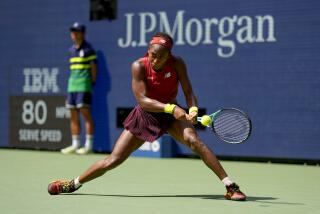Steffi Graf’s Maturation Has Gone Beyond Tennis
- Share via
LONDON — The emerging moods of Steffi Graf are somehow reassuring. She is as skittish as any other 20-year-old, with the startling exception that she possesses a Grand Slam and two Wimbledon titles. Masses of shagged blond hair fall in her face, and her hand shyly covers what little is left of it. She wears bulky sweaters and loafers. She is blunt, humorous, impatient.
Graf, about to enter her third year as the No. 1-ranked woman in tennis, has seen some of the world and it has seen some of her. Not much, maybe, but enough to suggest that the West German is not the blank-faced, ambitious machine she seemed to be in sweeping the Australian and French opens, Wimbledon and the U.S. Open last year. There are times, perhaps, when she does not live only for the pleasure of striking a tennis ball with the force of her whole body. She likes musicals and leather jackets, and she is having her first public romance.
At 20 Graf is no longer an ascending child star, but a rapidly maturing, well-established one who is grappling with the realization that life and tennis only will get more complicated. Her veneer of invincibility fell away at the French Open when 17-year-old Arantxa Sanchez Vicario upset her in the final, and Graf almost seemed appreciative, hugging her afterward. When she defeated second-ranked Martina Navratilova to defend her Wimbledon title in a difficult three-set match on Sunday, she alternately giggled and wept.
“You enjoy it even more than you did before,” she said. “When you lose a couple of times, it makes you realize how difficult it is. There were times last year when I just didn’t know how much I was winning, and how tough it was.”
Graf’s performance in the last three years has made everything look easy. She has made the finals in 10 straight Grand Slam events, and won six of them. Her massive baseline game, in particular the forehand that could fell a tree, has become recognized as the most significant occurrence in tennis since Chris Evert struck a two-handed backhand. The number and ease of Graf’s victories are such that she already has said she can’t see playing the game much beyond her twenties.
“I’d say I doubt it,” she said.
The more she has won, the more there has been a demand to know who is behind this gigantic talent. But Graf can be extracted only in pieces, because she is deeply, reflexively private. For all of the speculation that at any moment she will establish residency in the principality of Monaco or Boca Raton, Fla., she continues to maintain a home in Bruhl, West Germany, with her parents, Peter and Heidi, who are intent on preserving semblances of normalcy.
She returned home to Bruhl after Wimbledon to pack for an extended vacation with her family. They are going to an island to be alone, and there will be no rallies or festivities in Bruhl. “There have been enough receptions for Steffi Graf,” Bruhl’s mayor said. “She is entitled to a little peace.”
Now dating Alex Mronz, a fellow West German tennis player, Graf is struggling to reconcile her tennis ambitions with her disdain for public life. She retreats further the more personal questions become, and gets little enjoyment in being recognized. “You can’t,” she said. “I mean, you can’t be free. Okay, some people enjoy it, but not me. It’s too much. I avoid it. But I’m opening up a little bit more. I was shy before.”
Graf’s resentment of intrusion stems partly from the fact that her personal welfare is a topic of conversation wherever she goes. Doesn’t she feel she is missing something? Isn’t she playing too much tennis for her own good? How can she last much longer? “Oh come on,” she finally snapped back during the French. “Is it really so serious?”
There apparently is little need for so much concern, because Graf is proving a durable champion, despite a weakness for colds and stomach ailments. At 5 feet 9 and 132 pounds, she has a trim, muscled build and speed that suggests she would have been top-ranked at whatever she tried. “She’s a sprinter, a track and field athlete,” Navratilova said.
But the amassing of Graf’s record has gone beyond her physical gifts and into the realm of psychology. She is unyielding mentally, whether against the lowest-ranked player in the tournament or the highest. Every returned ball she views as a personal affront, and a match can seem utterly hopeless in view of her killer instinct. “Everybody has that feeling,” Graf said. “But not everybody can bring it out.”
Her coach, Pavel Slozil, has said her aim “is to satisfy the game.” The combination of her cruel groundstrokes and impassive visage has indeed made it seem as though Graf seeks some heightened tennis experience, and would be just as happy if tennis were played in a vacuum. She recently was forced to explain that she does perceive her opponents as people, and not just faceless victims or scores. “They aren’t just goals,” she said. “They are individuals.”
Graf lost just three matches last season, and has lost only two this year. There is one significant difference in her 1989 record, however: the failure to successfully defend her French title
When Sanchez Vicario won, it sent a ray of hope throughout women’s tennis. It seemed that if you played junk to the backhand and gave her nothing solid to lay her forehand on, she could be frustrated and perhaps even beaten. It particularly seemed so to Navratilova, who lost the No. 1 ranking to Graf and had lost in four of the last six Grand Slam events she had entered.
“That’s what happens when you have that aura of invincibility, which she’s had for a couple of years,” Navratilova said. “I had it before, and Chris had it before that. So much of it is built up, players go out on the court and think, ‘I don’t have a chance against her, I’ll just try to win three games or whatever.’ But then that player loses a couple of matches, and everybody starts walking around as if they can beat her too. And all that is mental. You haven’t even hit a ball yet, but you’re already approaching the match differently.
“Everybody’s got a chink in their armor somewhere. For me, it came over a half a year’s time. My losses first were physically related, but then even when I was fine, mentally I had lost that confidence. And everybody else started thinking they could beat me. So it was a snowball effect. Confidence is an incredible thing. It takes a long time to build it up, but you can shatter it overnight.”
The secret vulnerability of a top-ranked player is perhaps the greatest threat to Graf’s preeminence. So the victory at Wimbledon was particularly important to her; a loss would have thrown her series with Navratilova wide open again, and perhaps begun a widespread insurgency. As it is, she may be increasingly pursued by Navratilova, and 15-year-old Monica Seles and Sanchez Vicario are both fearless against her.
But Graf also seems to have a solid sense of her own position. She was relaxed and apparently immune to pressure or speculation that she could be beaten at Wimbledon. “I knew it myself and that is what is important, I think,” she said. Moreover, Graf relishes the prospect of rising players; she seems prepared to maintain her dominance for at least a few more seasons.
“I know that everybody is coming up. It was the same way when I was 15 or 16. I’m not afraid of it.”
More to Read
Go beyond the scoreboard
Get the latest on L.A.'s teams in the daily Sports Report newsletter.
You may occasionally receive promotional content from the Los Angeles Times.










